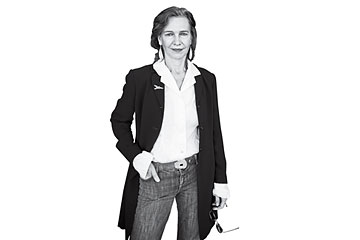
Half-Chippewa novelist Louise Erdrich
Were you surprised that your book The Round House won the National Book Award?
I was completely shocked. I didn't know how it would feel to win. I've been nominated twice before. My editor and I have a routine when we don't win. We look at each other and say, "We was robbed," and we smile at everybody else. So when my book was called out, I sort of lost consciousness. I can't remember what happened to me afterward.
How much of the novel is rooted in the reality of what happens on the reservation?
Crimes of sexual violence are absolutely a real problem, as is the difficulty in prosecuting them.
So is the book a crusade?
It's a suspense novel masking a crusade. The thing I wanted people to say is, "I could not put this book down." And then within that there would be this discussion of jurisdictional issues on reservations, of how tribal courts cannot prosecute a non-Native who commits a crime in Indian country. The first person [who tried to fix this] was Richard Nixon, who read the treaties and, as a true conservative, realized that certain rights should be inherent.
What are the main misunderstandings that non-Natives still have about Native Americans?
For many people, Native Americans are trapped in this 19th century ferocity. The military loves to invoke that ferocity--like with the Blackhawk and the Apache [helicopters]--and so do sports teams. One case in point is that the code name for Osama bin Laden was Geronimo. Native Americans serve in the U.S. military in a rate that far exceeds what one would expect from our [small] population. It's a point of pride to serve. The flag comes out first at every powwow. So to have Geronimo be associated with the enemy is very painful.
Your maternal grandfather was a tribal chairman, and you still visit the reservation a lot. How has it changed since your childhood?
Tribal community colleges have been enormously beneficial to Native communities. People don't have to leave to get higher education. I see more young people understanding that our survival depends on them becoming lawyers.
You are a novelist and a bookstore owner in Minneapolis. Do you actually work in the store?
They wouldn't let me touch the cash register. Sometimes I just go in and straighten things out. I like to talk people into buying certain books.
Have you talked someone into buying one of your books?
I'm from North Dakota. We wouldn't do that!
Is there a book you feel you have to defend?
Ernest Hemingway's books. I deplore the way he depicted Native women. But his style of writing was a very formative influence on me.
You went to Catholic school. Are you still mad at Catholicism?
I'm so full of fury that it doesn't even register anymore. It's not worth it. But I still feel a sense of fury at the ghastly idea that celibate old men can dictate what a woman does with her body.
Do you still have the confessional in your bookstore?
Yes, but now it's a forgiveness booth. You don't even have to touch it. It just exudes forgiveness.
